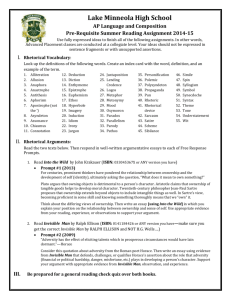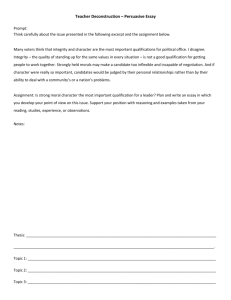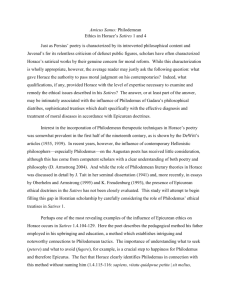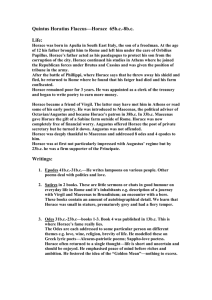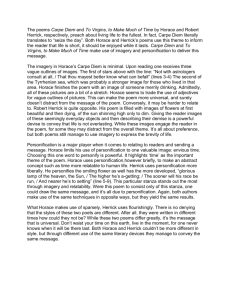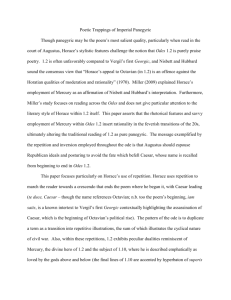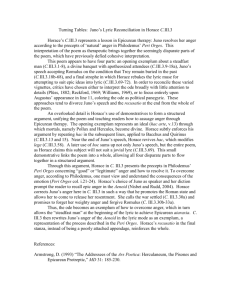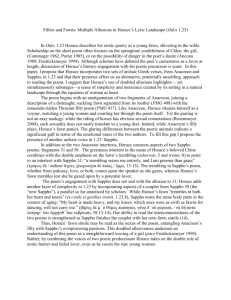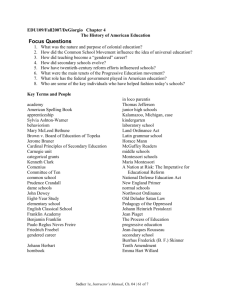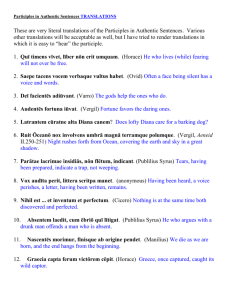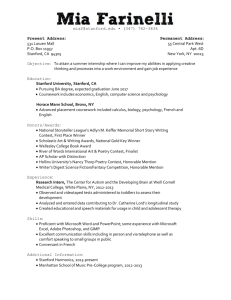Myrtia, nº 23, 2008, pp
advertisement
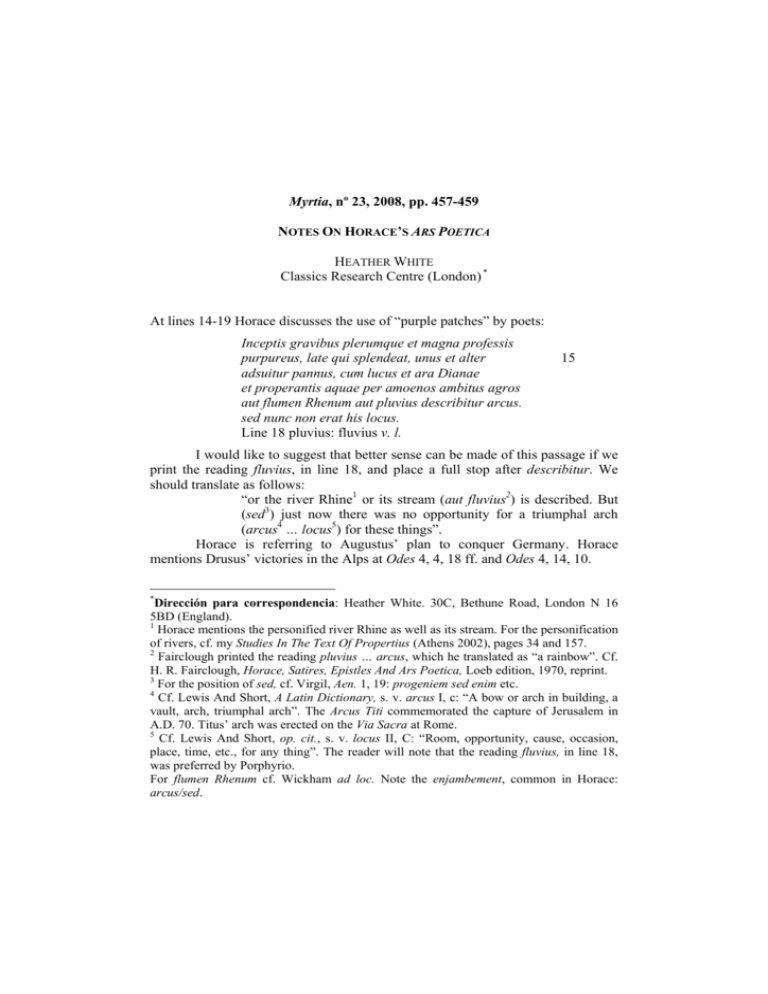
Myrtia, nº 23, 2008, pp. 457-459 NOTES ON HORACE’S ARS POETICA HEATHER WHITE Classics Research Centre (London) * At lines 14-19 Horace discusses the use of “purple patches” by poets: Inceptis gravibus plerumque et magna professis purpureus, late qui splendeat, unus et alter adsuitur pannus, cum lucus et ara Dianae et properantis aquae per amoenos ambitus agros aut flumen Rhenum aut pluvius describitur arcus. sed nunc non erat his locus. Line 18 pluvius: fluvius v. l. 15 I would like to suggest that better sense can be made of this passage if we print the reading fluvius, in line 18, and place a full stop after describitur. We should translate as follows: “or the river Rhine1 or its stream (aut fluvius2) is described. But (sed3) just now there was no opportunity for a triumphal arch (arcus4 … locus5) for these things”. Horace is referring to Augustus’ plan to conquer Germany. Horace mentions Drusus’ victories in the Alps at Odes 4, 4, 18 ff. and Odes 4, 14, 10. * Dirección para correspondencia: Heather White. 30C, Bethune Road, London N 16 5BD (England). 1 Horace mentions the personified river Rhine as well as its stream. For the personification of rivers, cf. my Studies In The Text Of Propertius (Athens 2002), pages 34 and 157. 2 Fairclough printed the reading pluvius … arcus, which he translated as “a rainbow”. Cf. H. R. Fairclough, Horace, Satires, Epistles And Ars Poetica, Loeb edition, 1970, reprint. 3 For the position of sed, cf. Virgil, Aen. 1, 19: progeniem sed enim etc. 4 Cf. Lewis And Short, A Latin Dictionary, s. v. arcus I, c: “A bow or arch in building, a vault, arch, triumphal arch”. The Arcus Titi commemorated the capture of Jerusalem in A.D. 70. Titus’ arch was erected on the Via Sacra at Rome. 5 Cf. Lewis And Short, op. cit., s. v. locus II, C: “Room, opportunity, cause, occasion, place, time, etc., for any thing”. The reader will note that the reading fluvius, in line 18, was preferred by Porphyrio. For flumen Rhenum cf. Wickham ad loc. Note the enjambement, common in Horace: arcus/sed. 458 H. White Lines 60-62: ut silvae foliis pronos mutantur in annos, prima cadunt: ita verborum vetus interit aetas, et iuvenum ritu florent modo nata vigentque. 60 Horace means that, just as leaves which were in excellent condition fall off the trees in autumn, so words which were perfect fall into desuetude. Here, prima does not have a temporal meaning. The leaves which are said to fall off in autumn are not in perfect condition (arescunt, arescere: Pliny XVI, 34, 82 and 84). Here prima “excellent” is used as indicated in Kühner-Stegmann I, page 239, 2, i. e. it means “leaves which were excellent”6. This is confirmed by Horace’s own words: he explains that words which are now in good repute will fall out of use. Cf. lines 70-71: cadentque/ quae nunc sunt in honore vocabula. Lines 63-66: debemur morti nos nostraque: sive receptus terra Neptunus classes Aquilonibus arcet, regis opus, sterilisve diu palus aptaque remis vicinas urbes alit et grave sentit aratrum, Fairclough (p. 456) explained that Horace alludes, in lines 65 ff., to the draining of the Pomptine marshes. I would like to suggest that in lines 63-64 Horace refers to the canal which Drusus7 constructed in order to protect the Roman fleet (classes) from shipwreck due to the north wind (Aquilonibus8). Drusus campaigned against the Germans from 12-9 B.C. However, on the return march from the Elbe in 9 B.C., Drusus was fatally injured by a fall from his horse. He was therefore not able to enjoy a triumphal return to Rome. Horace alludes to Drusus’ death in line 63, when he states that we are all doomed to die, even if a canal protects the Roman fleet from northern gales, and thus saves the lives of Roman soldiers. Brink, in his edition and commentary ad loc., obelizes regis, because he has not understood that Regis opus means “regale opus”, “work worthy of a king”, cf. Wickham ad loc. and Kühner-Stegmann I, p. 208 ff. 6 Cf. Lewis And Short, s. v. primus II, B, and Forcellini, s. v. 4, a, de rebus. Villeneuve, in his Budé edition, and Brink ad loc. have not understood that prima means here “excellent”. 7 Drusus subjugated the territory between the Rhine and the Elbe in four campaigns (12-9 B.C.). He was greatly helped by the Roman fleet, for whose use he built a canal from the Rhine to the Zuider Zee, in order to provide a shorter and safer route to the mouth of the Elbe. 8 For the fact that Germany is windy, cf. Tacitus, Germ. 5. Notes On Horace’s Ars Poetica 459 Prof. G. Giangrande tells me that the hitherto metrically inexplicable palus can be explained as an archaism, i. e. as presenting the “ apocope di –s finale”, with final –u shortened by the initial a- of aptaque (cf. G. Giangrande, Myrtia 19, 2004, page 242)9. For details cf. G. Giangrande’s paper “Il metodo storico nella critica testuale”, forthcoming in Habis. Lines 202-205: Tibia non, ut nunc, orichalco vincta tubaeque Aemula, sed tenuis simplexque foramine pauco Adspirare et adesse choris erat utilis atque Nondum spissa nimis complere sedilia flatu; Line 203 pauco: parvo v. l. Fairclough printed the reading pauco and imagined that Horace is referring here to a flute “with few stops” (foramine pauco). It should, however, be noted that the flute (tibia10) had many stops: cf. Ovid, Met. 12, 158 longave multifori … tibia buxi (“or the long flute of boxwood pierced with many holes”). Consequently, I would like to suggest that the correct reading in line 203 is parvo. The flute was simple and had small holes11 (foramine parvo). Cf. Ovid, Met. 4, 123 tenui … foramine (“through a small aperture”). Lines 248-250: offenduntur enim, quibus est equus et pater et res, nec, si quid fricti ciceris probat et nucis emptor, aequis accipiunt animis donantve corona. Line 249 fricti: stricti v. l. 250 I would like to suggest that the correct reading in this passage is stricti. Horace states that if the buyers of chickpeas and nuts approve of something which was written by a man who has been attacked (stricti12), the knights will not be pleased, and they will not award a prize to the writer. 9 As is well known (cf. H.J. Van Dam, Statius, Silvae Book II, Leiden 1984, Index, s. v. archaisms) a history of archaisms in Latin poetry remains to be written. 10 For the flute cf. also Gow, Theocritus, Cambridge 1965, reprint, vol. II, page 529. 11 For the employment of the poetic singular, cf. my Studies In The Text Of Propertius, page 141. 12 Cf. Lewis And Short, s. v. stringo II, D: “to wound, pain” … nomen alicuius (Ovid, Tr. 2, 350). Note the use of the substantivized participle; cf. Ars poetica 120, whwew honoratum means “a distinguished man”.
